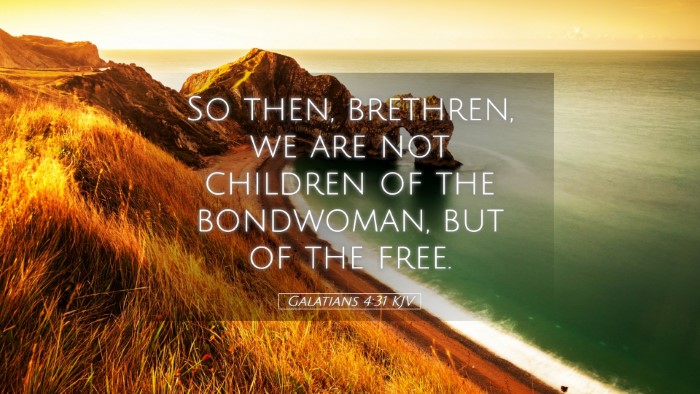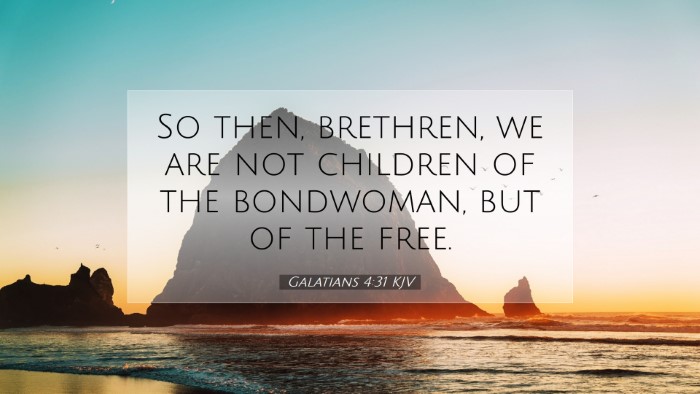Galatians 4:31 - Commentary and Insights
Verse Text: "So then, brethren, we are not children of the bondwoman, but of the free."
Introduction
The Apostle Paul concludes the allegorical teaching found in Galatians 4 by drawing a powerful contrast between two covenants symbolized through Hagar and Sarah. In this verse, he emphasizes the believer's status as free children of God through faith in Christ, rather than slaves under the law represented by Hagar, the bondwoman. This summary draws from various public domain commentaries to explore the depth of this passage.
Context and Meaning
Paul's message in Galatians revolves around the tension between law and grace, freedom and bondage. The epistle is aimed at addressing the influence of Judaizers who insisted that believers adhere to the Mosaic Law for justification. The closing of chapter 4 serves as the culmination of his argument, declaring the true identity of believers.
1. Paul’s Argument Against Legalism
In Matthew Henry's Commentary, Paul’s defense of Christian freedom is highlighted as a rejection of legalism. The bondwoman represents the law, which cannot bring true sonship or inheritance. Instead, Paul affirms that believers are heirs through the promise, established in the gospel of grace.
2. The Allegory of Hagar and Sarah
Albert Barnes elaborates on the allegorical meanings of Hagar and Sarah. Hagar's children, born out of the flesh and bound by the law, contrast with Sarah's children, who are born of the promise through faith. The distinction is crucial; it underlines that Christians do not achieve their standing before God through works of the flesh but through grace.
3. Spiritual Freedom
Adam Clarke comments on the concept of spiritual freedom communicated in this verse. He emphasizes that while all men are born in sin, believers in Christ are liberated from that bondage. By defining themselves as children of the free woman, Christians take on their new identity rooted in spiritual freedom. Clarke further stresses the importance of living in the reality of this freedom, encouraging believers to embrace the grace that defines their new life in Christ.
Theological Implications
Understanding Galatians 4:31 involves grappling with significant theological truths relevant to Christian identity and assurance. Below are some implications drawn from the commentaries:
- Identity in Christ: The verse signifies that believers are no longer defined by the law or their past failures. Instead, they are defined by their relationship with Christ.
- Assurance of Faith: The assurance that comes from being children of the free woman plays a crucial role in the believer’s confidence before God. It underlines that salvation is based on faith in Christ’s work, not on human merit.
- Call to Live Out Freedom: As children of the free, believers are called to live in the reality of their freedom. This includes rejecting legalism and embracing life in the Spirit, as further explored in Galatians 5.
Practical Applications
The truths found in Galatians 4:31 can be directly applied to life and ministry. Here are some applications for pastors and theological students:
- Grace over Law: Teach congregations the importance of relying on grace rather than falling into the trap of legalism, which can stifle spiritual growth.
- Affirming Identity: Help congregants understand their identity as free children of God, encouraging a life empowered by the Holy Spirit rather than performance-based practices.
- Community of Freedom: Foster a church community that embodies freedom in Christ, promoting unity and support among members who recognize their shared identity in the gospel.
Conclusion
Galatians 4:31 serves as an important reminder of the believer’s status in Christ. As we navigate various doctrinal discussions and practical applications, may the essence of this verse ground us in the truth of our liberty as children of the free. The insights from commentary traditions enrich our understanding, urging all believers, theologians, and pastors to embrace their identity in Christ and share that freedom with others.


